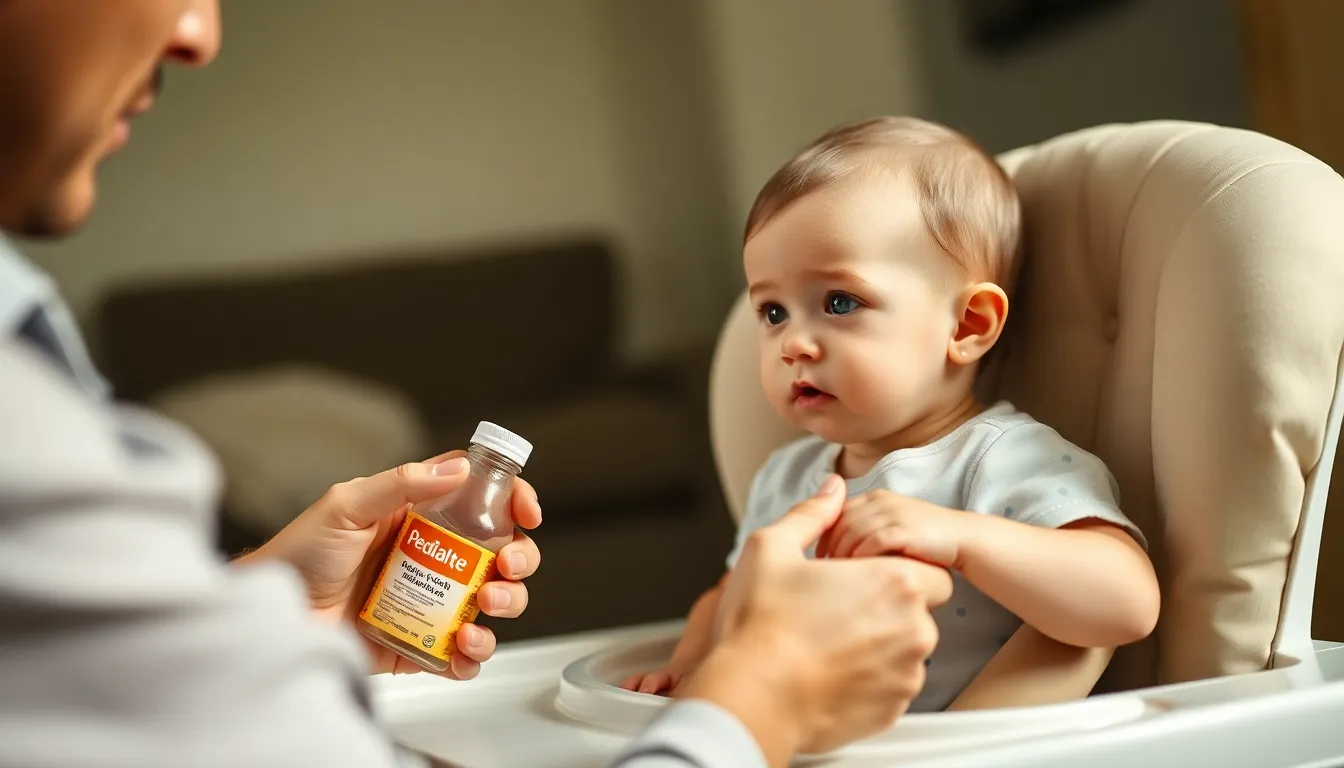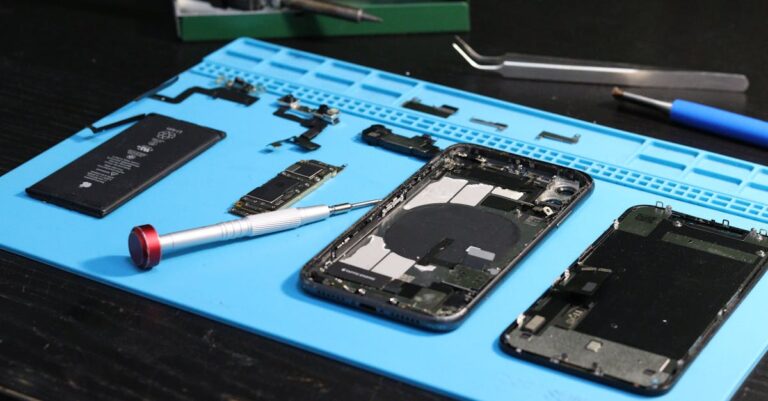When your little one’s feeling under the weather, it can be a real rollercoaster of emotions for any parent. You want to help them bounce back faster than a rubber ball, and that’s where Pedialyte comes in. This magical elixir isn’t just for adults nursing a hangover—it’s a hydration superhero for babies too! But how much should an 8-month-old actually drink?
Table of Contents
ToggleUnderstanding Pedialyte
Pedialyte serves as a crucial solution for maintaining hydration in infants. It offers essential electrolytes and fluids that help restore balance during illness.
What Is Pedialyte?
Pedialyte is a rehydration solution designed specifically for children. It contains water, sugar, and electrolytes like sodium and potassium to prevent dehydration. This product often comes in various flavors and packaging options, making it appealing to young ones. Pediatricians commonly recommend Pedialyte for babies experiencing mild to moderate dehydration due to diarrhea or vomiting.
Benefits of Pedialyte for Infants
Pedialyte provides several benefits for infants facing dehydration. It swiftly replaces lost fluids and electrolytes, promoting recovery. Unlike some juices or sodas, Pedialyte contains an optimal balance of sugar and salt, enhancing its effectiveness. Infants often tolerate this solution better than plain water, especially during times of illness. Parents find comfort in knowing that it supports their child’s hydration needs and helps regulate electrolyte levels.
Recommended Dosage for 8 Month Old

Proper hydration is vital for an 8-month-old, especially when they’re not feeling well. Parents often look for specific dosage guidelines for Pedialyte to ensure their child remains hydrated.
General Guidelines
For an 8-month-old baby, 2 to 4 ounces of Pedialyte every 1 to 2 hours is generally recommended. This amount helps replace fluids lost during illnesses like diarrhea or vomiting. It’s advisable to introduce Pedialyte slowly to ensure the baby tolerates it without any discomfort. Monitoring the baby’s response can help in determining the appropriate amount as their needs may vary.
Factors Influencing Dosage
Various factors can impact the required dosage of Pedialyte. The severity of dehydration plays a crucial role; more severe dehydration may necessitate increased intake. Additionally, the baby’s weight significantly influences fluid needs, with larger babies potentially needing more. The frequency of vomiting or diarrhea also affects how much hydration the child requires. Lastly, consultation with a pediatrician often provides the most personalized and effective advice for each child’s situation.
Signs of Dehydration in Infants
Dehydration in infants requires prompt recognition. Parents should be aware of specific signs that indicate when their baby may be dehydrated.
Recognizing Symptoms
Common symptoms include decreased urine output, dry mouth, and lethargy. Additionally, a sunken soft spot on the baby’s head can signal dehydration. Irritability often accompanies these symptoms, making it essential to observe the baby’s mood. Cold hands and feet may also occur, indicating impaired circulation due to fluid loss. Monitoring these signs helps parents determine the urgency of the situation.
When to Seek Medical Advice
Consulting a pediatrician is crucial if dehydration symptoms worsen. If the baby shows signs of severe dehydration such as lack of tears while crying or extreme irritability, immediate medical attention becomes necessary. Additionally, difficulty keeping fluids down warrants a visit to the doctor. Regular weight checks can assist parents in identifying dehydration early. Always prioritize a healthcare provider’s insights for tailored recommendations based on the baby’s unique needs.
Alternatives to Pedialyte
Parents seeking hydration options for an 8-month-old have several alternatives to consider.
Homemade Oral Rehydration Solutions
Homemade oral rehydration solutions can effectively hydrate infants. A simple recipe involves mixing 1 cup of clean water, 1 tablespoon of sugar, and 1/2 teaspoon of salt. This combination provides essential electrolytes necessary for recovery. Adjusting the sugar and salt ratio can tailor the solution to your baby’s needs. Many parents find this mixture convenient and effective for mild dehydration. Additionally, it allows for control over ingredients, making it a safe choice.
Other Commercial Options
Several commercial hydration products can serve as alternatives to Pedialyte. Brands like Infalyte and Ceralyte offer similar electrolyte solutions designed for infants. Each brand contains a specific blend of electrolytes tailored for children. Parents should consider checking product labels to ensure suitability for their baby’s age. Some options come in flavored varieties, appealing to older infants. Choosing a reputable brand recommended by pediatricians can enhance safety and effectiveness in rehydration efforts.
Keeping an 8-month-old hydrated during illness is crucial for their recovery. Pedialyte serves as an effective solution for replenishing lost fluids and electrolytes. Parents should follow recommended dosage guidelines and monitor their baby’s response to ensure proper hydration. Recognizing signs of dehydration is essential for timely intervention.
It’s also wise to consult a pediatrician for personalized advice tailored to the child’s needs. Exploring alternatives like homemade rehydration solutions or other pediatrician-recommended products can provide additional options for parents. Prioritizing hydration not only aids in recovery but also supports overall health and well-being.



